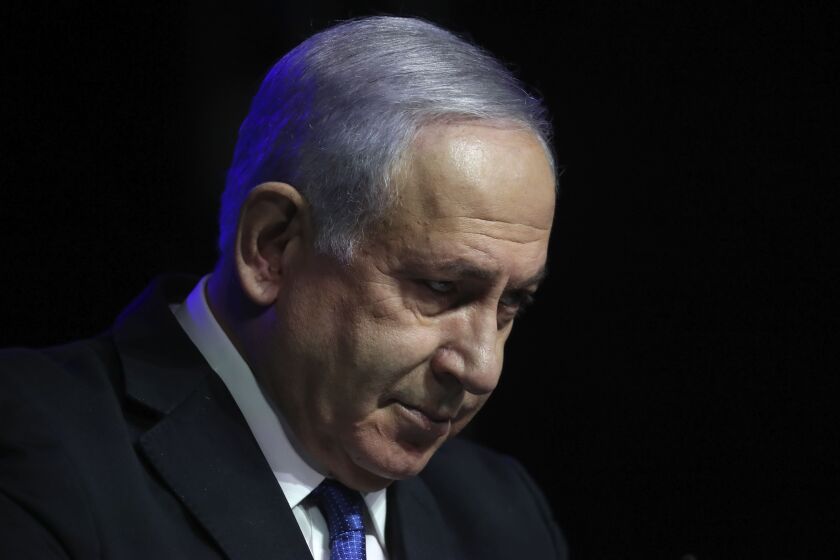JERUSALEM — Israel will swear in a new coalition government on Sunday, led by ultranationalist Naftali Bennett, ending Prime Minister Benjamin Netanyahu’s record 12-year rule — and a political crisis that inflicted four elections on the country in under two years.
The coalition consists of eight parties from across Israel’s political spectrum. It includes a small Arab party that made history by joining a government for the first time.
If even one party bolts, the government would be at serious risk of collapse, and Netanyahu, who intends to stay on as opposition leader, is waiting in the wings.
Here’s a look at what to expect:
FRAGILE COALITION
The coalition holds only a slight majority in the 120-member Knesset — Israel’s parliament — and includes parties from the right, left and center.
But about the only things they agree on are that Netanyahu, who is on trial for corruption, should leave office and that the country cannot endure another back-to-back election.
They are expected to adopt a modest political agenda acceptable to Israelis from across the ideological divide. Their first big challenge will be to agree on a budget, the first since 2019. Economic reforms and infrastructure spending could follow.
Bennett will serve as prime minister for the first two years, followed by the centrist Yair Lapid, a former journalist who was the key force behind the coalition. But that’s only if the government survives that long.
MANAGING CONFLICT
Bennett is a religious ultranationalist who supports settlement expansion and opposes a Palestinian state. But he risks losing his job if he alienates his dovish coalition partners.
That will likely mean a continuation of Netanyahu’s approach of managing the decades-old conflict without trying to end it. Annexing the occupied West Bank and invading Gaza are probably off the table, but so are any major concessions to the Palestinians.
Every Israeli government has expanded Jewish settlements in the occupied West Bank and east Jerusalem, which Israel captured in the 1967 war and which the Palestinians want for their future state. This new government is expected to do so in a subdued way that avoids angering President Joe Biden’s administration, which is pushing for an eventual revival of peace talks.
The government is expected to maintain Netanyahu’s hard-line stance on Iran and oppose Biden’s efforts to revive its international nuclear deal. But senior officials have vowed to do so behind closed doors rather than bringing the rift into the open, as Netanyahu did during the Obama years.
The new government also is expected to work with Biden to strengthen ties with Arab states.
HEALING DIVISIONS
The biggest change will likely be the government’s struggle to heal the divisions in Israeli society that opened up during the Netanyahu years between Jews and Arabs and between ultra-Orthodox and secular Israelis.
“The government will work for all the Israeli public — religious, secular, ultra-Orthodox, Arab — without exception, as one,” Bennett said Friday. “We will work together, out of partnership and national responsibility, and I believe we will succeed.”
The United Arab List, a small party with Islamist roots led by Mansour Abbas, is the first Arab party to be part of an Israeli government coalition. For helping to oust Netanyahu, Abbas is expected to secure large budgets for housing, infrastructure and law enforcement in Arab communities.
Israel’s Arab citizens make up 20% of the population and face widespread discrimination. They have close familial ties to the Palestinians and largely identify with their cause, leading many Jewish Israelis to view them with suspicion. Tensions boiled over during last month’s Gaza war, when Jews and Arabs fought in the streets of Israel’s mixed cities.
The new government already faces hostility from Israel’s ultra-Orthodox community — staunch supporters of Netanyahu. Ultra-Orthodox leaders have condemned it, with one demanding that Bennett remove his yarmulke, the skullcap worn by observant Jews.
RETURN OF THE KING?
After a quarter-century at the highest levels of Israeli politics, the 71-year-old Netanyahu, dubbed the “King of Israel” by supporters, will be opposition leader and the head of the largest party in parliament.
He’s expected to do all he can to bring down the government, in part because his best hope for avoiding conviction on serious corruption charges is to battle them from the prime minister’s office, with a governing coalition that could grant him immunity.
But his presence could continue to bind his opponents together. Bennett, already branded a traitor by much of the right-wing base he shares with Netanyahu, heads a tiny party and is unlikely to get another shot at the top job.
Netanyahu could face a challenge from within his defeated Likud party. But he retains a strong hold on the party’s institutions and base, and senior members are unlikely to challenge him unless his downfall is assured.






